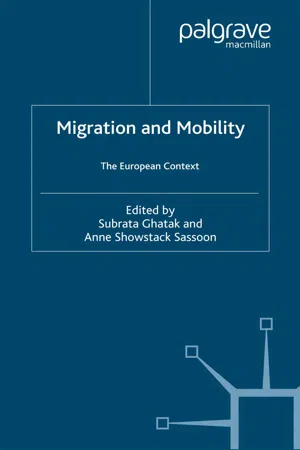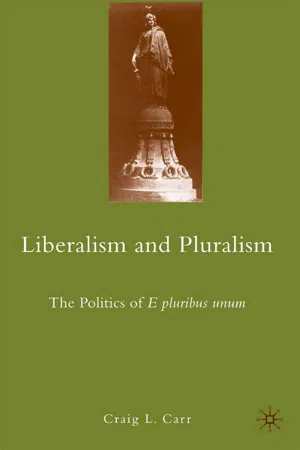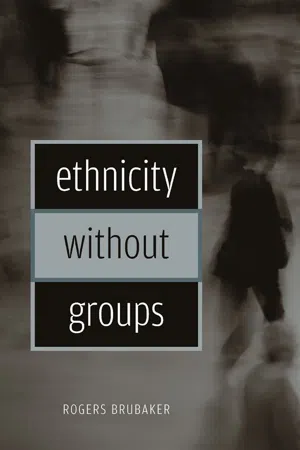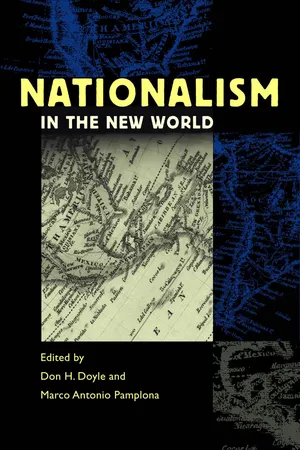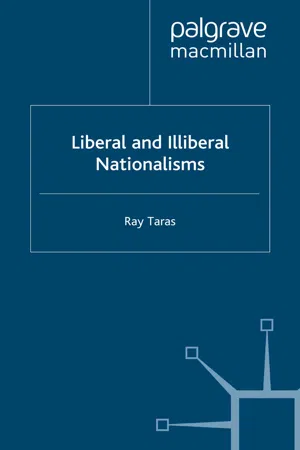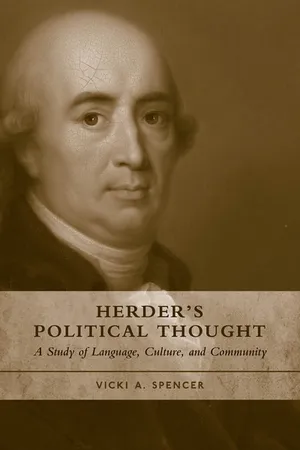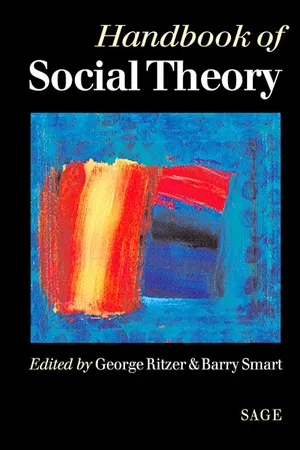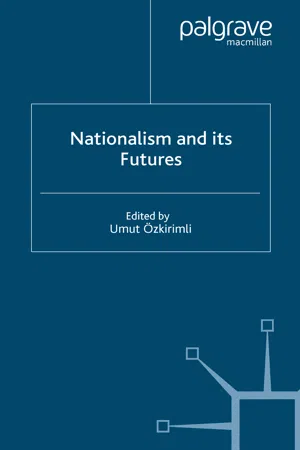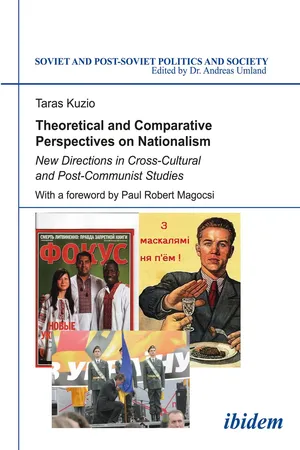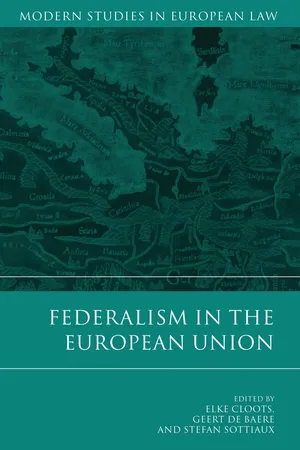Politics & International Relations
Civic Nationalism
Civic nationalism is a political ideology that emphasizes the importance of a shared civic identity and values, rather than a common ethnic or cultural heritage, as the basis for national unity. It promotes equal rights, responsibilities, and opportunities for all citizens, regardless of their background, and often advocates for inclusive and participatory democratic processes.
Written by Perlego with AI-assistance
Related key terms
1 of 5
11 Key excerpts on "Civic Nationalism"
- eBook - PDF
Migration and Mobility
The European Context
- S. Ghatak, A. Sassoon, S. Ghatak, A. Sassoon(Authors)
- 2001(Publication Date)
- Palgrave Macmillan(Publisher)
If real and sustained progress is to be made, it will be suggested, alternative conceptions of political association and mem- bership need to be articulated and grounded in a more confident and assertive internationalist or cosmopolitan frame of reference. S. Ghatak et al. (eds.), Migration and Mobility © Palgrave Macmillan, a division of Macmillan Publishers Limited 2001 84 Philip Spencer Civic versus ethnic nationalism The distinction between civic and ethnic forms of nationalism is now widespread in the literature. In his popular work on nationalism, for instance, the writer and broadcaster Michael Ignatieff offers the following definition of the first kind: ‘Civic Nationalism maintains that the nation should be composed of all those – regardless of race, colour, creed, gender, language or ethnicity – who subscribe to the nation’s political creed. This nationalism is called civic because it envisages the nation as a com- munity of equal, rights bearing citizens, united in patriotic attachment to a shared set of political practices and values’ (Ignatieff 1994: 3–4). The nation here is a political construct of some kind, formed somewhere and somehow as a political association conferring political and legal equality, rights and obligations on its (willing and consenting) members. In the ethnic model, by contrast, the nation is generally understood to be pre-political, a product of ancestry, something one is born into, a given, a fate rather than any kind of choice. In this ‘second brand of nationalism’, nations are ‘“communities of fate” bound together by seemingly objective qualities, such as history, language and culture and often, by connotation, blood ties. Rather than free associations . . . they [are] historically determined entities based on ancestry’ (Jenkins and Sofos 1996: 15). This distinction may then be applied to particular nations. - eBook - PDF
Liberalism and Pluralism
The Politics of E pluribus unum
- C. Carr(Author)
- 2010(Publication Date)
- Palgrave Macmillan(Publisher)
As should be apparent, there is more to Civic Nationalism, as I understand this notion, than merely a shared constitution and code of law. Underlying these institutions one will find a set of political beliefs, ideals, and commitments—a political theory, in short—that round out the notion of Civic Nationalism. Ameri- cans, for example, characteristically look at their constitution not simply as a legal document that both limits and authorizes the exercise of polit- ical power by the state, but also as a symbol that represents the political ideals of liberty and equality that characteristically matter to Americans, even though these ideals (as such) are hardly mentioned in the document itself. With time and interpretation, these ideals are written back into the document and in the process given a distinctive meaning that seems to become rather uniquely American. The history of free speech law in the United States, for example, is a product of the vicissitudes of polit- ical struggle across the land that has helped shape both the law and the animating political ideals of the country. When Americans praise the right of free speech, they have in mind, from a practical point of view, a rather complex civil liberty that is applied to specific problems in order to chart more concretely one dimension of the ideal of liberty that they typically claim to cherish. This provides a more specific meaning to the claim, proposed earlier, that polities have evolutionary histories that distinguish them from one another and provide them with a type of loca- tional uniqueness that can serve as a source of pride for citizens. But this unique identity, and the history behind it, belongs to the realm of civic N AT I O N H O O D A N D T H E L I B E R A L P O L I T Y 111 nationalism; it remains an element of the political bond that coheres the state into a polity in spite of all else that happens to separate and distance the groups living there from one another. - eBook - PDF
- Rogers Brubaker(Author)
- 2006(Publication Date)
- Harvard University Press(Publisher)
More common is the use of the civic-ethnic opposition to make dis-tinctions between states—or between national movements—rather than between whole world regions. This is often done in an ideolog-ical mode, to distinguish one’s own good, legitimate Civic Nationalism from the illegitimate ethnic nationalism found elsewhere. The leaders of postindependence Ukraine and Kazakhstan, for example, have self-consciously used the language of civic nationhood to present their states to domestic and especially international audiences as paragons of civic inclusiveness and tolerance, as states of and for all their citi-zens, rather than as states of and for a single ethnocultural group. They—and scholars sympathetic to their cause—have pointed to in-clusive citizenship legislation, liberal language laws, and rhetoric of civic inclusiveness to mark a contrast with Estonia and Latvia, with their restrictive citizenship legislation, tough language laws, and rhetor-ical emphasis on ethnocultural survival. Many separatist movements, too, use this self-legitimating language of Civic Nationalism. The general election manifesto of the Welsh na-tionalist party Plaid Cymru, for example, proclaims its commitment to a “Civic Nationalism [that] welcomes all those living in Wales to join us in finding the solutions to [social and environmental] challenges and in restoring the equilibrium of social justice and environmental sustainablity in Wales and Europe.” 3 Scottish National Party (SNP) leaders emphasize even more strongly the party’s Civic Nationalism, es-pecially its inclusive, residentially based definition of Scottishness. So pronounced is this emphasis that a fringe nationalist group opposed to the SNP’s rhetoric of Civic Nationalism has caustically criticized the “hogwash about being Scottish just because you happen to live in Scotland . - eBook - PDF
- Don Doyle, Marco Pamplona(Authors)
- 2010(Publication Date)
- University of Georgia Press(Publisher)
36 Other countries vary on the same dimension (and in Europe the Eu-ropean Union is developing a mainly civic, assimilationist legal framework), but it is important to recognize that the difference is one of proportion and ideological emphasis. 37 As Smith has remarked, “All nations bear the impress of both territorial and ethnic principles and components, and represent an uneasy confluence of a more recent ‘civic’ and a more ancient ‘genealogical’ model of social cultural organization.” 38 Not all scholars accept the distinction or hold it to be sharp; those who do use it often attribute ethnic nationalism to countries that are “late modernizers.” 39 Central to the idea of Civic Nationalism is the possibility for citizens to adopt national identity by choice. This is most commonly discussed in terms of the assimilation of individual immigrants into nation-states; civic nations can in principle be open to anyone who agrees to follow their laws. Citizenship in the state is seen as primary rather than prior membership in a descent group or cultural tradition. The distinction is fuzzy, though, as a rhetoric of civic na-tionalism and citizenship can mask underlying commitments to particularistic cultural or racial definitions of what counts as a “proper” or good citizen. Thus (in a recently prominent example) even law-abiding Muslims may not seem suf-ficiently French to many; conversely, the French state may pass laws ostensibly enforcing neutrality on religion but in fact expressing particular ethnocultural mores. It is particularly difficult to frame rationales for limits on immigration in civic nationalist terms without falling back on ethnic nationalism. At the same time, the civic nationalist tradition contains another thread. This is the notion that the nation itself is made, is a product of collective action. This is symbolized by revolutions and the founding of new states (which may include more or less successful efforts to call forth national solidarities). - eBook - PDF
- R. Taras(Author)
- 2002(Publication Date)
- Palgrave Macmillan(Publisher)
2 Nationalisms Conceptually No one questions the importance of nationalism in giving life to individual nations, securing them homelands, and affecting much of international politics. 1 Investigating what the term actually means has generated an enormous body of scholarship over the past century. Defining nationalism is problematic for two general reasons. First, there is such a variety and large number of theories concerned with nationalism. Second, the concept is closely connected to other terms like nation, nationality, nation-state, na- tional identity, national self-determination, and ethnicity. Scholars disagree not only about the meaning of nationalism but how it is related to these other terms. This chapter approaches nationalism conceptually. It reviews different definitions, typologies, and schools of nationalism. The focus is on the most influential frameworks developed to study the phenomenon. The concept of nation The term nation has been understood in two main ways in modern times ± cultural nation (Kulturnation) and political nation (Staatsnation). Cultural nation emphasizes the spirit of community based on objective characteristics such as common heritage and language, a distinct territory, shared religion, customs, and history. Individuals have little or no choice as to which cultural nation they adhere to: membership in it is determined by nature and history. Generally a cultural nation precedes the establishment of a state; the experi- ence of Italy ± precocious culturally, a latecomer politically ± serves as a vivid example. The transition to political nation occurs when a nation identifies political objectives and develops statist ideas. 2 A political nation is one based on shared political will, political values, citizenship, and loyalty and affection for the nation. 3 This is what the French historian Renan had in mind when, in his famous 1882 lecture `Qu'est-ce qu'une nation?' (`What is a nation?') he described it as a `daily plebiscite'. - eBook - PDF
Herder's Political Thought
A Study on Language, Culture and Community
- Vicki A. Spencer(Author)
- 2017(Publication Date)
- University of Toronto Press(Publisher)
Nationalism 133 from this conception, Herder argues in his Humanitätsbriefe that neither ‘geographical borders’ nor ‘a parliament of rulers’ alone determines the whole of a ‘Nation,’ or Volk . 18 Herder’s concept is far broader than the modernist, civic conception of the nation. To be sure, the modern nation is not always conceived solely in civic and legal terms. A number of scholars employ a twofold classification that distinguishes civic from cultural nationalisms. John Plamentaz’s essay, ‘Two Types of Nationalism,’ was highly influential in populariz-ing this classification, but Andrew Vincent traces it to the earlier ideas of Hans Kohn, who divided nationalism into Western and Eastern types: 19 The former, premised on Enlightenment liberal values of reason and uni-versalist humanism, aimed at a more open, plural, outward-looking soci-ety. It tended towards democracy, liberalism and constitutional rule and its communal bonds were envisaged more loosely. Its aim was to liberate the individual. The latter was more overtly authoritarian, closed, inward-looking, particularist and xenophobic, with more inclusive communal views of the self. Plamentaz echoed this distinction directly. 20 For Plamentaz, Civic Nationalism denotes the more benign and accept-able form of nationalism of the West in contrast to the far more ag-gressive cultural nationalism emanating from Eastern Europe. Unlike Meinecke’s original application of the idea of an apolitical Kulturna-tion to Herder’s thought, 21 there is nothing apolitical about the way in which cultural nationalism came to be understood in Anglo-American political theory. A more recent version of this twofold classification is found in Smith’s work. For him, the civic notion of the nation with its emphasis on the legal and political equality of its members and a shared civic culture is a particularly Western construction. - eBook - PDF
- George Ritzer, Barry Smart, George Ritzer, Barry Smart(Authors)
- 2001(Publication Date)
- SAGE Publications Ltd(Publisher)
13 Religion has played a role too, but this has mostly been marginal, exceptions being Ireland, Poland and Israel. Important as language is, the cultural component of nationalism more or less always contains an identification with history in the sense of a myth of origins. Mention must also be NATIONALISM 475 made of the role of territory in defining the nation, relevant in the case of Serbia (Hooson, 1994). However, it is important to stress that the nation as a cultural community is more than an ethnos: nationalism and ethnicity are not coeval. The nation is also a political community, a dimension which is closely related to the state, though is not reducible to the state. In this context the nation is closely identified with a particular territory, a legal order, a state, and even a governing elite. Nations can thus be defined in terms of the kind of community to which they give substance. Closely related to the political dimension of community there is the additional question of the role of ideology. Nationalism can be put alongside liberalism, conservatism and socialism as one of the great ideological doctrines of modern times. As a political ideology, national-ism is a doctrine codified by elites who sought to mobilize the masses or, in other cases, sought to provide a system of legitimation for a political order. Of particular importance in this regard is the pivotal role of intellectuals in the codification of nationalism (Giesen, 1993). Arguably, the two most influential ideologies of modern nationalism were those of Giuseppe Mazzini and Woodrow Wilson. Mazzini was the apostle of modern republican nationalism and argued that nations of a certain size have a right to states of their own. In his conception the nation is essentially a territorially large cultural community which has a historical right to be realized in a sovereign state. - eBook - PDF
- U. Ozkirimli(Author)
- 2003(Publication Date)
- Palgrave Macmillan(Publisher)
Nationalism and Cosmopolitanism 95 It is complete in that it is self-sufficient and has a place for all the main purposes of human life. It is also closed, in that entry into it is only by birth and exit from it is only by death. (Rawls 1993: 41) Rawls is aware of migration, war and global media, of course. But he imagines questions of international justice to be just as that phrase and much diplomatic practice implies: questions ‘between peoples’, each of which should be understood as unitary. Note also the absence of atten- tion to local or other constituent communities within this conception of society. Individuals and the whole society have a kind of primacy over any other possible groupings. This is the logic of nationalism. This is precisely what cosmopolitanism contests – at least at its best – and rightly so. Indeed, one of the reasons given for the very term is that it is less likely than ‘international’ to be confused with exclusively intergovernmental relations (Archibugi 1998: 216). Advocates of cosmopolitanism argue that people belong to a range of polities of which nation-states are only one, and that the range of significant relationships formed across state borders is growing. Their goal is to extend citizenship rights and responsibilities to the full range of associations thus created. In David Held’s words, people would come, thus, to enjoy multiple citizenships – political membership in the diverse political communities which signifi- cantly affected them. They would be citizens of their immediate political communities, and of the wider regional and global net- works which impacted upon their lives. (1995: 233) Though it is unclear how this might work out in practice, this chal- lenge to the presumption of nationality as the basis for citizenship is one of the most important contributions of cosmopolitanism. The cosmopolitan tension with the assumption of nation as the prepolitical basis for citizenship is domestic as well as international. - eBook - PDF
The Nation and Nationalism in Europe
An Introduction
- Ireneusz Pawel Karolewski, Andrzej Marcin Suszycki(Authors)
- 2011(Publication Date)
- EUP(Publisher)
In this sense, representatives of the communitarian school of thought see a common nationality and nationalism, with both terms being used synonymously, as an indispensable instrument to sustain egalitarian principles of national social citizenship and social justice and they regard the persistence of nationalism as something justified and desirable under normative points of view. Nationalism is considered to be unavoidable not only because it serves to bind members of a community to the place they consider their homeland and supports their overall cooperation but, even more important, it encourages them to recognise that they have special ties to their compatriots, and that they owe their compa-triots more than they owe to non-members, including even greater personal sacrifices. 65 Hence, co-nationals are bound in a double way, as they owe humanistic obligations to each other as human beings as well as political and social obligations to each other as members of a historically grown collective project. 66 Common nationality and nationalism have these effects on individuals and communities because they help to generate trust and a strong specific feeling of solidarity and loyalty, which are seen as the most important preconditions for a just distribution of welfare. 67 What is more, the communitarian perspective empha-sises that trust, solidarity and loyalty can only be achieved within the borders of clearly delineated national communities: Language, history, and culture come together . . . to produce a collective consciousness. National character, conceived as a fixed and permanent mental set, is obviously a myth but the sharing of sensibilities and intuitions among the members of a historical community is a fact of life. 68 - No longer available |Learn more
Theoretical and Comparative Perspectives on Nationalism
New Directions in Cross-Cultural and Post-Communist Studies
- Taras Kuzio(Author)
- 2007(Publication Date)
- Ibidem Press(Publisher)
A less confusing division of European states would be according to whether they are civic or ethnic. One should recognise that both inclusive and eth-nic states promoted – and continue to promote – ‘nationalising’ policies for, as Charles Tilly points out, ‘Almost all European governments eventually took steps which homogenised their populations’ (Tilly 1975: 43). The application of ‘national-iser’ to only post-communist Europe also ignores the strong homogenising tendencies still prevalent in liberal democracies. Civic states are therefore neither fully civic nor themselves devoid of ‘nationalising’ tendencies. Civic states also possess ‘cultural baggage’, need a ‘rich legacy of memories’ and the identity of the governed people is defined nationally, not universally (Yack 1999: 106). Brubaker’s theory of ‘nationalising’ states could be ostensibly applied to ethnic states because members of the non-titular minorities are not granted political rights, particularly citizenship and voting (Arabs in Israel, for example). This is how I define nationalising states in my five-part classification later in this article. In exclusive states the boundaries are clearer because certain groups are excluded from the politi-cal community, civil rights are not granted and minorities may be violently repressed. Nevertheless, these factors common to ‘nationalising’ ethnic states are also to be oc-casionally found in civic states. Germany was a civic democracy only for ethnic Germans until the late 1990s. Russia, Croatia and Moldova are civic states but have PERSPECTIVES ON NATIONALISM 47 violently repressed their national minorities. Ethnic states such as Belarus and Yugo-slavia do not exclude people from citizenship, showing that ethnic states are not al-ways exclusive (just as civic states are not always supportive of polyethnic rights). Scholars continue to remain confused when defining civic, inclusive, ethnic and exclusive states. - eBook - PDF
- Elke Cloots, Geert De Baere, Stefan Sottiaux, Elke Cloots, Geert De Baere, Stefan Sottiaux(Authors)
- 2012(Publication Date)
- Hart Publishing(Publisher)
National pluralism, then, while different from orthodox liberal nationalism, is a truer development of liberal nationalism’s core idea. I think national pluralism is normatively superior to both orthodox liberal nationalism and constitutional patriotism. But I also think it offers a better descrip-tion of what is actually going on in many multinational States. Liberal nationalists describe such States as political communities without shared nationality—they argue that the national-cultural ties are to be found among the sub-State units, such as Quebec or Flanders, not Canada or Belgium. And constitutional patriots would see such a State as not honouring pre-political commitments at all. But to think that there are no national-cultural ties at the multinational level, or that multinational States do not engage in nation-building is misguided. Multinational States engage in nation-building just as much as sub-State nations or independent nation-States: they have official holidays, they honour political heroes, their representatives give political speeches, they tend to filter the news in State-wide terms, they have boundaries which inevitably foster a State-wide identity, they typically embrace their internal linguistic diversity as something to be proud about and to foster, they typically hold the foreign policy competence and thereby engender a feeling of reaching out as a nation to other nations, and so on. And citizens do tend to experience nationality also at the multinational level, as the numbers cited above suggest—in that sense the term ‘multinational State’, suggesting the State consists of several nations but is itself no longer a nation, is a 184 Helder De Schutter misnomer. Rather than there being no shared ties of nationality at the State level, such ties are pursued and citizens experience them in ways which are not funda-mentally different from those ties at sub-State levels.
Index pages curate the most relevant extracts from our library of academic textbooks. They’ve been created using an in-house natural language model (NLM), each adding context and meaning to key research topics.
